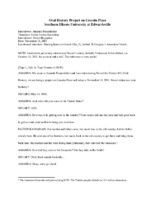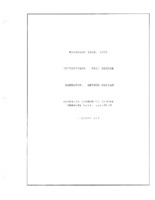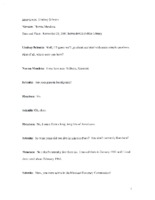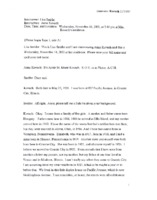Browse Items (19 total)
| Thumbnail | Title | Description | Date | Date Added |
|---|---|---|---|---|
 |
Nevart Hagopian Oral History Interview | This oral history interview with Nevart Hagopian was part of oral histories conducted in the fall 2001 semester of History 447: Oral History. Nevart Hagopian is a survivor of the Armenian genocide who left Armenia with her mother at the age of 12 in 1920 and migrated to the Lincoln Place neighborhood of Granite City. In the interview, she discusses the Armenian community and culture in Lincoln Place. Hagopian primarily speaks in Armenian in the interview, with Vartan Kassabian serving as a translator. Father Kassabian was a priest for St. Gregory Armenian Church in Granite City. Note: The original archive copies of the interview transcript and biographical summary had grading marks and corrections on them. We converted the transcript and biographical summary to editable text and made the corrections to remove grading marks. |
November 18, 2001 | May 5, 2020 |
 |
Arthur Bedian Oral History Interview | This oral history interview with Arthur Bedian was part of oral histories conducted in the fall 2001 semester of History 447: Oral History. Author Bedian lived his whole life in Lincoln Place and was born to an immigrant father from Armenia. In this interview, he talks about his father’s experience immigrating through Ellis Island, growing up in Lincoln Place, the community center, and his time and service in the Armenian Orthodox Church. There was no audio recording of this interview in the original archive, but there is a transcript and biographical summary. |
November 18, 2001 | September 2, 2018 |
 |
Isabella Vartan and Helen Abbott Oral History Interview | This oral history interview with Isabella Vartan and Helen Abbott was part of oral histories conducted in the fall 2001 semester of History 447: Oral History. Isabella Vartan and Helen Abbott are the daughters of Armenian immigrants who have been lifelong residents of the Lincoln Place neighborhood. In this interview, they talk about their parent's experience in Armenia during World War I and immigration to the United States, their participation in the Armenian Orthodox Church, growing up as the children of immigrants, involvement in the local community center, and the diversity of the Lincoln Place neighborhood. |
October 10, 2001 | March 18, 2018 |
 |
Hagop Varadian Oral History Interview | This oral history interview with Hagop Varadian was part of oral histories conducted in the fall 2001 semester of History 447: Oral History. Hagop (Jake) Varadian was born on April 12, 1938 to Armenian immigrants and has been a lifelong resident of the Lincoln Place neighborhood. In this interview, he talks about his parent's life in Armenia during World War One and his mother’s experience in the Armenian Genocide which resulted in her having to live in the desert where her sister was born. He also touches on aspects of his own life that include being in the Army and teaching school for the Granite City School District. |
November 6, 2001 | March 18, 2018 |
 |
Michael Torosian Oral History Interview | This oral history interview with Michael Torosian was part of oral histories conducted in the fall 2001 semester of History 447: Oral History. Mr. Torosian is a first-generation American. His father emigrated from Armenia in 1913. His mother was a refugee; she emigrated sometime after the genocide of the Armenians in 1915. Mr. Torosian was born in Lincoln Place and describes growing up there as the most wonderful childhood anyone could have. He lived there for the first twenty-nine years of his life, excluding the time he was in the service. Mr. Torosian indicated that the community center played a major part in his life as a child. He states that from the age of eight or nine, he was there almost every night. He stated that the Community Center was the envy of the surrounding area. The combination of caring people, citizenship classes, sewing classes and a beautiful basketball gymnasium made the center a wonderful place. Additionally, the fact that it was paid for by Mr. Howard and constructed with local labor provided employment for many families in Lincoln Place during the depression. Mr. Torosian described the mix of different ethnic groups as educational. Lincoln Place provided the structure for education about many different cultures. Everyone learned from each other. The sense of community was very evident in Lincoln Place. Mr. Torosian and I also discussed the Armenian Genocide and issues surrounding its lack of acknowledgment and publicity. He graciously states that genocide was the responsibility of the regime in charge at the time, and not all the Turks. |
November 15, 2001 | March 18, 2018 |
 |
Charles Merzian Oral History Interview | This oral history interview with Charles Merzian was part of oral histories conducted in the fall 2001 semester of History 447: Oral History. Mr. Charles Merzian is a second generation American. His father emigrated from Armenia in 1910, and his mother emigrated from Armenia shortly later. They were married in 1925 and became naturalized American citizens in 1945 and 1946 respectively. They had two children, Charles (born in 1928) and Nell (born in 1933). In this interview, Mr. Merzian describes life while growing up in Lincoln Place in two primary locations for socialization, the community center (the clubhouse) and Sim’s place (later honored as Sim’s college), and how they impacted the lives of virtually everyone living at Lincoln Place. Mr. Merzian stresses that the multi-ethnic relationships established when growing up were a definite asset in preparing him for his working career. |
November 1, 2001 | March 16, 2018 |
 |
Norma Mendoza Oral History Interview | This oral history interview with Norma Mendoza was part of oral histories conducted in the fall 2001 semester of History 447: Oral History. Norma Mendoza moved to Lincoln Place after she got married in 1960 and lived there until 1966. In this interview, she describes her experience working with the Mexican Honorary Commission, the diversity of the community, food and entertainment within the community, arranged marriages, different aspects of her career, and the local army depot. |
November 28, 2001 | March 15, 2018 |
 |
Andreas Matoesian Oral History Interview | This oral history interview with Andreas Matoesian was part of oral histories conducted in the fall 2001 semester of History 447: Oral History. Mr. Matoesian is a first-generation American. His father emigrated from Armenia in 1920 and settled in Lincoln Place Granite city. He related a story about his father’s experience coming through Ellis Island. His mother emigrated a little earlier and first lived in Davenport Iowa and then Lincoln Place after they were married. Mr. Matoesian was born in Lincoln Place in 1937 and lived there for 21 years. Mr. Matoesian is a Judge in Madison County Illinois. He worked his way through school as a barber in his father’s barbershop in Lincoln Place. Mr. Matoesian voiced memories about going to the community center in somewhat of a pre-school or day school setting during his pre-school years. He further related, during his grade school years that all of the teachers were very nice. He states that as an adult he found that they, the teachers, had been handpicked due to their sensitivity to the diverse ethnic group. Mr. Matoesian states that he feels that sports is the great levelizer. Being active in sports allowed people to break through other barriers. Mr. Matoesian states that he feels the exposure to multiple ethnic groups made him a more tolerant person, a person more accepting and appreciative of differences. Mr. Matoesian and I spoke briefly about the Armenian Genocide and his thoughts on the lack of publicity and acknowledgement of this horrific event. |
October 11, 2001 | March 15, 2018 |
 |
Dena Lovacheff Oral History Interview | This oral history interview with Dena Lovacheff was part of oral histories conducted in the fall 2001 semester of History 447: Oral History. Though Dena Lovacheff did not grow up in Lincoln Place, she moved there in 1951 when she married her husband, William Lovacheff, and resided there until 1988. In this interview, she describes her childhood, the family-run business called Louie’s Market, and living with her in-laws in the Lincon Place community. |
November 29, 2001 | March 15, 2018 |
 |
Anne Kovach Oral History Interview | This oral history interview with Anne Kovach was part of oral histories conducted in the fall 2001 semester of History 447: Oral History. Anne Kovach was born in Macedonia in 1907 and immigrated to the United States with her father as a young child and has lived in Lincoln Place for most of her life. In this interview, she talks about her father’s career as an American Steel employee and saloon owner, the grocery store she owned with her husband, the education of girls learning English as a second language, the sowing girls did for the war effort during World War II, the Bulgarian-Macedonian Ladies Aid Society, and the Cyril and Methody Bulgarian-Macedonian Church in Lincoln Place. |
October 29, 2001 | March 14, 2018 |
